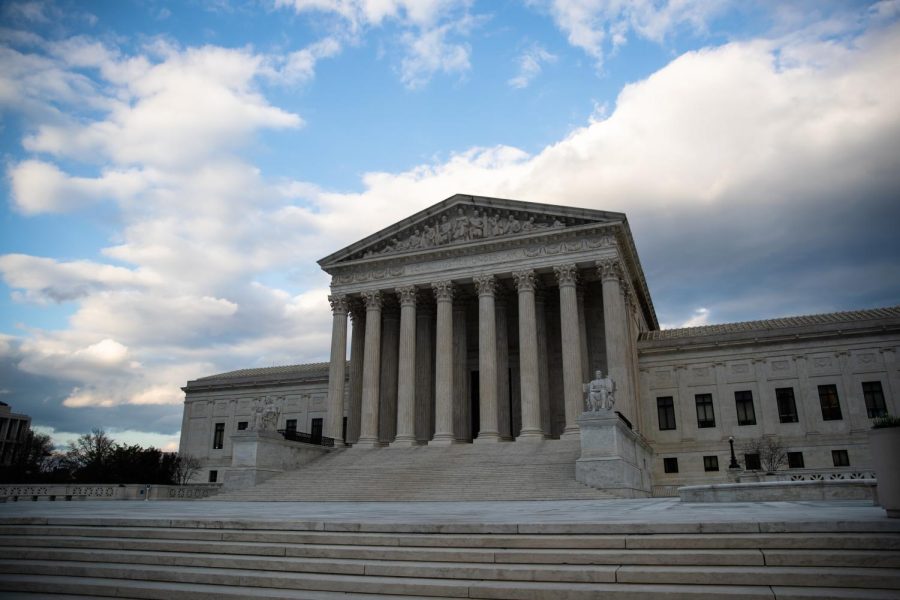Opinion | Originalism is a political movement disguised as judicial philosophy
Originalism’s true goal is to increase the political power of reactionaries.
The United States Supreme Court Building is seen on Sunday, April 3, 2022.
July 3, 2022
The recent term of the Supreme Court has brought upon big wins for reactionaries in support of forced birth.
The decision of Dobbs v. Jackson has been justified under originalism, a theory of jurisprudence that advocates for interpreting the constitution as a perfect, final document.
That said, when one stops and thinks for two seconds, it becomes clear that originalism is not actually credible jurisprudence, but rather a right-wing political movement on a mission to overturn the last 70 years of progress.
This overturning of progress is exemplified by the Dobbs ruling as it allowed the state of Mississippi to implement an abortion ban 15 weeks after gestation and explicitly stated that the right to an abortion is not protected by the constitution.
This overturned the precedent set by Roe v. Wade, and Planned Parenthood v. Casey the cases which protected the right to abortion under the privacy clause of the 14th amendment.
The vapidness of originalist thought can be summarized by Justice Alito’s majority opinion in Dobbs v. Jackson.
The ruling was justified by Alito in that th majority held the view that for a prospective right to be protected by the constitution, that right must be “deeply rooted in the history of the nation.”
Essentially, Alito’s argument boils down to the idea that if the founding fathers believed that the right to an abortion must be protected, they would have enshrined it in the constitution. To simplify, since the word abortion is not mentioned in the constitution, the constitution does not grant the right to an abortion.
The logic of Alito’s originalism fails on two fronts. First the nature of how societies interpret rights change as time progresses. In 1789, when the constitution was written, it protected the so-called right of slavery through implementation of the fugitive slave and three-fifths clauses.
Thus, if we follow the logic of originalism, since the right to enslave others is deeply rooted in the founding of our nation and a right that our framers defended, the 13th and 14th amendments violate the spirit of the constitution and should be overturned.
Of course, when one takes originalism to its natural conclusion, it becomes clear how foolish it is to base decisions of law on the interpretations of people who lived three centuries ago. Just to rub salt in the wound, the framers themselves agreed with the view that the constitution was not a document set in stone.
As believed by both Thomas Jefferson and James Madison, the constitution was to be interpreted as a living breathing document that served as a guiding principle for future generations. Not a document to be taken literally.
In fact, Jefferson himself took this point to the extreme and argued that about every two decades, the constitution should be rewritten in order to better fit the times and issues affecting the polity.
Based on the viewpoint of the fathers and originalism’s superficiality as jurisprudence, it seems that originalist jurists are misguided.
However, the internal logic and historical context of originalism makes it clear that these jurists are charlatans disguised as principal jurists. This is because originalism’s intended purpose is to turn the United States into a draconian society.
When one peaks behind the mask of jurisprudence, it becomes clear originalism is the culmination of a right-wing political movement bent on dismantling the achievements of the American experiment. Achievements that have drastically improved the quality of life for millions of Americans.
Originalism is not meant to persevere and help achieve a more perfect union, rather it is a reactionary ideology meant to preserve the power of white, Christain conservatives.
Columns reflect the opinions of the authors and are not necessarily those of the Editorial Board, The Daily Iowan, or other organizations in which the author may be involved.














